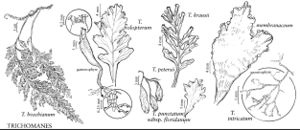Trichomanes punctatum subsp. floridanum
Acta Bot. Neerl. 11: 299. 1962.
Plants on rock or epiphytic. Stems long-creeping, threadlike, bearing scattered leaves, covered with dark hairs of 2 types, 2-celled glandular hairs and elongate rhizoidlike hairs; roots absent. Leaves round to oblanceolate, simple or irregularly lobed at apices, 5–10 × 2–9 mm, with dark stellate hairs on margin and 2-celled glandular hairs on petioles and veins; petioles shorter than blades. Venation repeatedly forking from the base with few unconnected false veins. Soral involucres 1–6 per blade, terminal on blades, long-conic, flaring at mouth; involucre lips inconspicuously dark edged. Gametophytes composed entirely of branched filaments. Gemmae composed of short filaments of undifferentiated cells. 2n = 68.
Habitat: On rock in limestone sinks, rarely epiphytic on trunks and roots of trees in limestone sinks
Elevation: 0–100 m
Distribution

Fla.
Discussion
Some early authors listed Trichomanes sphenoides Kunze as occurring in Florida. J. G. Wessels Boer (1962), however, reduced T. sphenoides to T. punctatum subsp. sphenoides, which occurs in the Greater Antilles, Central America, and western South America, and considered all the Florida material to be the endemic T. punctatum subsp. floridanum.
Selected References
None.
